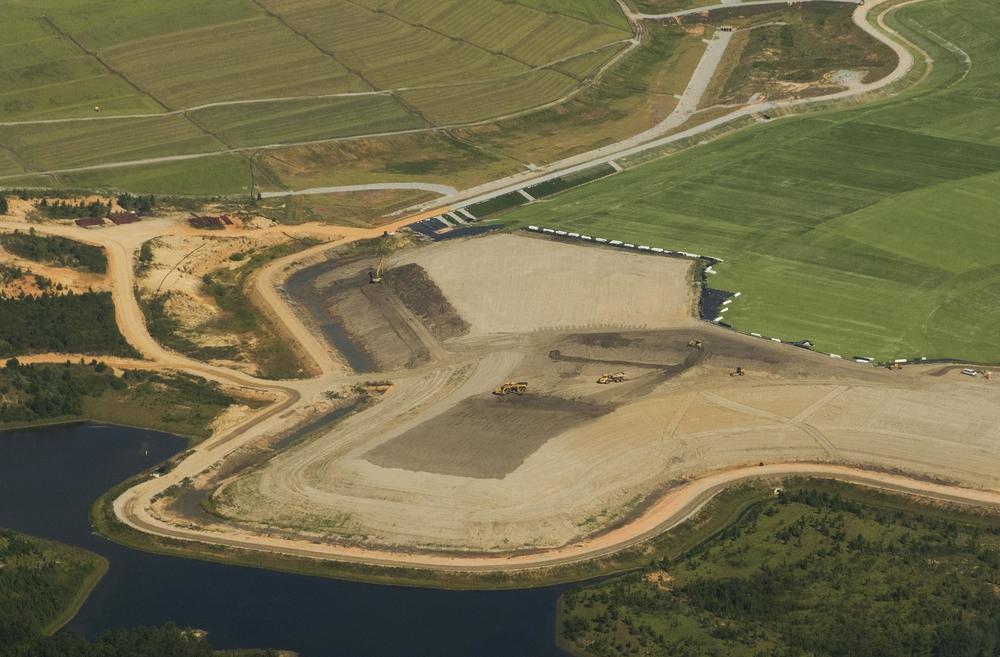
Caption
Work in progress in closing an ash pond at Plant Yates in Coweta County in September 2023.
Credit: Grant Blankenship / GPB News
|Updated: September 29, 2023 8:12 AM
Georgia environmental advocates told the Environmental Protection Agency during a public hearing Wednesday their state’s coal ash management permitting program deserved the same scrutiny as that of neighboring Alabama. during a public hearing on the EPA’s proposed rejection of Alabama program.
The EPA seeks to deny Alabama its request to run its own coal ash management because the federal agency believes state regulators are flouting a 2015 EPA rule prohibiting coal ash being stored in contact with groundwater. Chronic exposure to coal ash is linked to deadly cancers and other serious health conditions,
But according to the Georgia Environmental Protection Division, some Georgia ash ponds of high concern to environmentalists are closed, or are near closure, in contact with groundwater before draft permits for their closure have been issued by the state.
During the hearing on Alabama’s program, Georgia advocates said that warrants EPA acting in Georgia as they would in Alabama.
“EPA's decision to deny Alabama State program on the grounds that it issued permits approving Alabama Power's plans to cap in place in contact with groundwater is encouraging,” Altamaha Riverkeeper Fletcher Sams said during the hearing. . "However, in my state, we need EPA's help urgently."
Sams lives near Georgia Power’s Plant Scherer, where the utility now plans to drain and remove coal ash from the fraction of the ash pond where the material is deeply submerged in the aquifer — which, for decades, residents also used for their drinking water. Many have long suspected cancers and other maladies suffered by area residents are connected to that fact.
Georgia Power still plans on capping most of the Scherer pond with no protection against underground water infiltration.
Coosa Riverkeeper Jesse Demonbreun-Chapman's asked the EPA to apply its regulatory power to his watershed, which straddles both Alabama and Georgia.
“Just over the state line there is located Georgia Power's Plant Hammond, where Ash Pond 3 currently has a draft permit that would continue to leave that coal ash sitting in groundwater,” Demonbreun-Chapman said.
What's more, the closure plan at Hammond, which includes a water-impermeable liner as part of the cap but no underground liner, was completed in 2018, years before the plan was technically greenlit by Georgia EPD through their permitting process, according to William Cook manager of the agencies solid waste program.
The ash pond at Plant McDonough in Cobb County is capped and closed, too, without any draft permit from EPD describing the closure the agency will formally allow there.
Sams suspects both facts reflect an intentional abuse of the regulatory landscape by Georgia Power.
“Georgia Power Company is seeking to use the EPA-approved state EPD coal ash permitting process to gain an agency rubber stamp for these wrongful polluting closure methods," Sams said.
Advocates like Sams would like to see the EPA exercise the same absolutism in Georgia it seeks to employ in Alabama. But Georgia differs from Alabama in that it has, for years, already been given control of its own coal ash disposal program. Even in the wake of the EPA’s recent more muscular implementation of its own coal ash and groundwater rule, agency officials regularly defer to the EPD on coal ash questions.

Work in progress in closing an ash pond at Plant Yates in Coweta County in September 2023.
William Cook of the Georgia EPD said while closure at McDonough and the soon to be completed closure at Plant Yates in Coweta County may give the appearance of finality, from a regulatory standpoint they are really interim solutions.
“I want to stress it's more protective in this state than it would be otherwise if it was just left open and exposed," William Cook said of the Plant McDonough pond closure.
Or put another way, any cover on an ash pond is better than no cover, and the cap on top of the ash pond at Plant McDonough could either be temporary or final, depending on how what Cook said are ongoing conversations between the EPA and EPD shake out.
“Right now the plans that we're looking at would not get [coal ash] out of groundwater," Cook said of the McDonough site. "Groundwater would still be in it.”
Cook said his agency is considering alternatives to what the riverkeepers and others see as the EPA’s concrete rule mandating coal ash removal — what Cook and Georgia Power refer to as “advanced engineering methods.”
"There's some that they have proposed that we're reviewing," Cook said. "And it's essentially a wall that goes underneath the ground that isolates the groundwater that's underneath it.”
Such a strategy would still require a costly cracking open of the earthen roof of a coal ash pond, essentially undoing years of work. Georgia Power has already spent over $1 billion on coal ash management to date.
“The cap doesn't prevent them from going back in and then digging up the ash or even completely removing all the ash that's in there,” Cook said. “So again, from that standard, that's why I'm trying to make clear is that this isn't a done deal.”
The EPA declined to comment on the adequacy of work at McDonough or Yates in the context of their own rule, instead deferring to Georgia EPD.
Georgia Power representatives said the company continues to work with Georgia EPD on permits for both sites and that pond closure is not complete until final permits are issued and additional regulatory milestones are met. Therefore, they said, the company is in regulatory compliance.
William Cook of EPD said that is true from the agency perspective. That’s because, for now, EPD makes the coal ash rules and issues the permits, and it’s impossible to be out of compliance with permits that don’t exist.